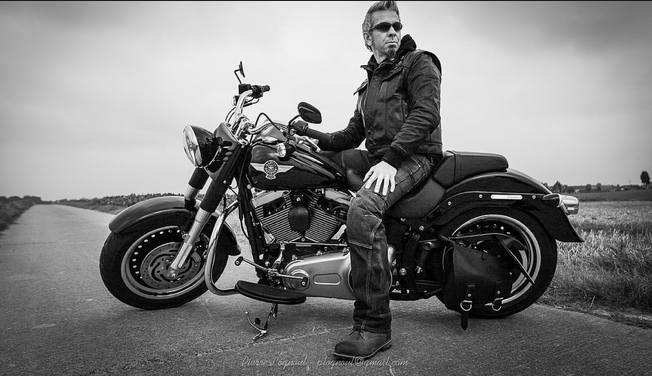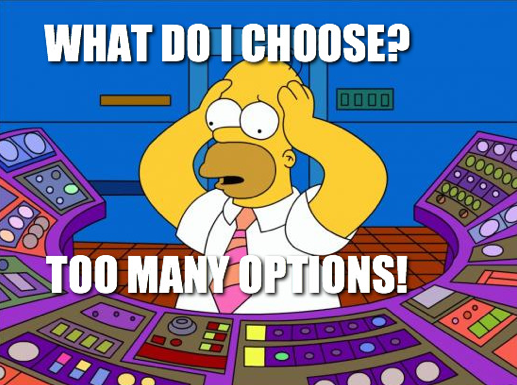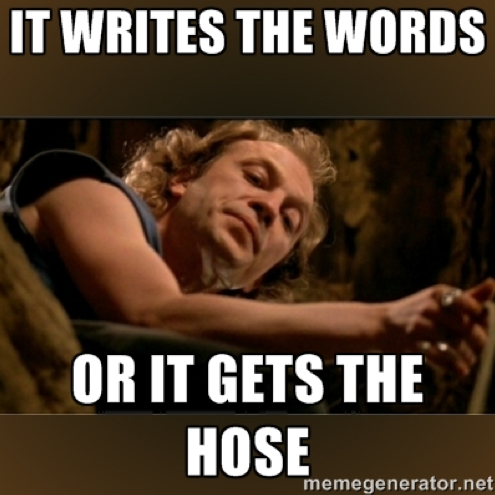
Image via Flickr Creative Commons courtesy of Ken.
Very often when I write about brand and platform, writers assume I am talking about promotion and marketing (ads) and that is not only a false assumption, it can be a fatal one. When we hop onto Twitter or Facebook and are barraged with book spam, a big reason it annoys us (though not the only) is because the author is engaging in these activities with no solid brand or platform.
It then either becomes white noise (invisible) or worse an irritation (negative branding). Writers trying to create a brand by serving up copious book promotion will have a brand all right. The brand of self-serving asshat.
The sight of the author’s face or book might even be enough to spike our blood pressure. We are far more likely to block than buy.
Why? What went wrong?
We have to look at what a brand actually IS.
What’s in a Name?

Image via Flickr Creative Commons courtesy of Pierre Lognoul
The formula for a brand is simple:
NAME + PRODUCT + EMOTIONAL EXPERIENCE
The last part is critical. In fact it might be the most critical.
Why do you think corporate empires pay so much for image consultants? Sure, Mylan once had a great reputation as a pharmaceutical company until they got greedy and decided to line their pockets at consumers’ expense.
Three years ago if we heard the term “epi-pen” we might have experienced good emotions. Oh it is a life-saving drug. Helping kids with peanut allergies. My cousin had an epi-pen and it saved her life.
Nowadays? Different story. Once we found out the top execs have been giving themselves HUGE pay raises while hiking the cost of the only drug of this kind from $100 in 2007 to over $600 today?
Consumers are now seeing RED.
Seriously all it will take is one competitor to offer something comparable and it might just be enough to bury Mylan because greed is now part of their brand. That will be a tough stain to remove.
Even though they had an amazing product, they took advantage of having a monopoly and fattened their paychecks. I don’t know if there is a PR firm who can ever undo that damage. I’m fairly sure they’re going to be relegated to the Food Lion Dimension of Shame.
This example is to point out how important emotional experiences with a brand can be, that it has never been just the product.
It isn’t just about a good book anymore.
Why Are Brands So Important?

Most of us don’t have time to research each and every purchasing decision and thus, we as consumers, are prone to rely heavily on brands. Brands let us know what to expect.
When we buy Dolce & Gabbana shoes, we expect a certain quality. We go off the name and do far less inspecting and road-testing than we would for a designer/manufacturer we’d never heard of.
We are willing to order ahead of time and pay full price and even ridiculous prices for Coach, Ralph Lauren, Prada, Versace, Harley Davidson, Porsche, BMW, Mac Computers, John Deer, etc. So on and so forth.
Starbucks is hardly the best coffee, yet they’ve become almost synonymous with “coffee.” They also have branded a “coffee experience.”
But all of these companies (brands) did the same thing. They began with a name. Of course the name means nothing without a product. The name Harley Davidson would be just a name unless it came with motorcycles. But a name and a product alone are not enough.
Harley Davidson then had to go about crafting a unique emotional experience that was unlike its competition.
All of these brands we love have something in common, though. They built the brand and the platform first. Then any advertising or promotion is already advertising an existing brand. When we get a flyer that Levis are on sale, we know what Levis are. How do we know what they are? Levis is a brand.
All of these companies also have a platform.
What is a Platform?

Image via Flickr Creative Commons courtesy of Alex Santosa.
Platform is tethered inextricably with brand. If brand is the product, then platform consists of those most likely to consume that product because they emotionally identify with the brand.
Trust me, Harley Davison is not worried about consumers who love Vespas. Sure, they are both motorized bikes, but they are selling vastly demographics and experiences.
Authors are doing the same.
We know who Stephen King is because of his brand. Because of his brand (tons of books) we know if we are part of his platform or we aren’t. If we are the type of reader who loves a sweet romance? King isn’t trying to court us. Why? We might know his brand, but we are not part of his platform.
In the old days, there was only one way to create a brand (and consequently a platform) and that was the books. Lots and lots of books (brand) cultivated a body of people who liked our writing/voice (platform). Today that is still a great plan. With so much junk floating around, when readers find a writer they enjoy, they stick like glue.

Image via Flickr Creative Commons, courtesy of Craig Sunter
This is one of the main reasons that we need to keep writing. Stop promoting ONE book. ONE book is not enough to create a strong brand/platform.
Remember:
A brand is a collection of emotional experiences.
A platform is simply those who will enjoy that experience.
Modern writers hold the advantage here.
Before the digital age, it was practically impossible to create a brand outside of the books, because the book was the only source of emotional experiences with the author.
Readers rarely had contact with an author beyond the books. Book signings, maybe magazine or radio interviews gave only slight glimpses of the author beyond the book. Today, with social media? That is no longer the case. Every blog, tweet, post, video and interaction serve to create the overall brand.
This is how bloggers like Jenny Lawson (The Bloggess) were able to become runaway successes. Lawson already had a huge fan base from her blogs and her Twitter following before the first book was ever released.
Since we are writers our product is our words. This is how blogging can become such a vital part of our brand. But beyond that, it is also going out on social media (platform of your choice) and connecting. Create a positive emotion that goes hand in hand with our name.
Hint: Spamming the crap out of people does NOT create a positive experience.
Write More Books

Thus, whenever I mention building a brand/platform I’m in no way talking about promoting or advertising. Those are separate activities that come later and their success will rest largely on how well we’ve done our job with the brand/platform.
Once we realize this, we can breathe easier and know it is OKAY to keep writing books even if we have no mega-super-duper promotion/marketing/advertising campaign for that first book. It is okay to blog or even just hang out on social media connecting. That is a VITAL part of our job and if we skip it, then any marketing later will fall on deaf ears. In fact premature promotion can actually harm or even KILL a brand.
So relax 😀 .
What are your thoughts? Do you feel a little better that you don’t need to rush out with an ad campaign? Did this clear up the differences in brand and platform versus promotion?
I LOVE hearing from you!
To prove it and show my love, for the month of AUGUST, everyone who leaves a comment I will put your name in a hat. If you comment and link back to my blog on your blog, you get your name in the hat twice. What do you win? The unvarnished truth from yours truly. I will pick a winner once a month and it will be a critique of the first 20 pages of your novel, or your query letter, or your synopsis (5 pages or less).
Check out the other NEW classes below! Now including a log-line class! Can you tell me what your book is about in ONE sentence? If you can’t SIGN UP.
All W.A.N.A. classes are on-line and all you need is an internet connection. Recordings are included in the class price.
Upcoming Classes
Bullies & Baddies—Understanding the Antagonist September 2nd–September 2nd
All fiction must have a core antagonist. The antagonist is the reason for the story problem, but the term “antagonist” can be highly confusing. Without a proper grasp of how to use antagonists, the plot can become a wandering nightmare for the author and the reader.
This class will help you understand how to create solid story problems (even those writing literary fiction) and then give you the skills to layer conflict internally and externally.
Bullies & Baddies—Understanding the Antagonist Gold
This is a personal workshop to make sure you have a clear story problem. And, if you don’t? I’ll help you create one and tell the story you want to tell. This is done by phone/virtual classroom and by appointment. Expect to block off at least a couple hours.
Your Story in a Sentence—Crafting Your Log-Line
September 7th
Log-lines are crucial for understanding the most important detail, “WHAT is the story ABOUT?” If we can’t answer this question in a single sentence? Brain surgery with a spork will be easier than writing a synopsis. Pitching? Querying? A nightmare. Revisions will also take far longer and can be grossly ineffective.
As authors, we tend to think that EVERY detail is important or others won’t “get” our story. Not the case.
If we aren’t pitching an agent, the log-line is incredibly beneficial for staying on track with a novel or even diagnosing serious flaws within the story before we’ve written an 80,000 word disaster. Perhaps the protagonist has no goal or a weak goal. Maybe the antagonist needs to be stronger or the story problem clearer.
In this one-hour workshop, I will walk you through how to encapsulate even the most epic of tales into that dreadful “elevator pitch.” We will cover the components of a strong log-line and learn red flags telling us when we need to dig deeper. The last hour of class we will workshop log-lines.
The first ten signups will be used as examples that we will workshop in the second hour of class. So get your log-line fixed for FREE by signing up ASAP.
For those who need help building a platform and keeping it SIMPLE, pick up a copy of my latest social media/branding book Rise of the Machines—Human Authors in a Digital World on AMAZON, iBooks, or Nook.








33 comments
5 pings
Skip to comment form
Every time I read something from you on branding and platform it helps me understand it better. They have been hard for me to grasp…but I think I’m finally narrowing it down! 😉 My platform is my biggest concern…zeroing in on those readers I want. Thank you so much!
Author
If you have my book then you know how to do a word cloud. That is the most accurate picture of your platform.
Thanks for the reminder – I’ve got to dig into my word-cloud again, set a few blogging goals for the future (besides Just Keep Swimming).
Reblogged this on Jeannie Hall Suspense.
Reblogged this on ugiridharaprasad.
I was thrilled to read, “premature promotion can actually harm or even KILL a brand”. I tend to get tied up in writing/editing my novels and posts to the point that I forget to market. Fortunately, I think you are also correct that if we build a careful platform, we really don’t need to worry about marketing.
After reading your previous suggestions for building a platform, I wrote Latitudes & Cattitudes: Prequel to The Sea Purrtector Series. Some very Old background notes for Xander became the basis of Latitudes. This provides readers with a free way to determine if they like reading from a ‘cat’s purrspective’ + I included links to my other books for anyone who makes it to the end and wants to read more.
Just checked Latitudes’ Amazon ratings:
#6 in Kindle Store > Kindle Short Reads > 45 minutes (22-32 pages) > Teen & Young Adult
#10 in Kindle Store > Kindle Short Reads > 45 minutes (22-32 pages) > Mystery, Thriller & Suspense
#41 in Kindle Store > Kindle Short Reads > 45 minutes (22-32 pages) > Literature & Fiction
SO, while I’m not earning any direct cash from this little book, it is out there doing its job, which is more than I could say if the notes were still tucked in an old file.
Kristen, thank you for inspiring me to do that. Hope you have a wonderful weekend.
I did know branding and platforming (needed a parallel there) where not advertising and marketing, but that’s pretty much all I’ve truly gleaned about it. This help put it into a more tangible idea. Thanks!
So, the brand is like Coach or Levis. Basically, what you write. And add your social media presence to that. As an introvert that values her privacy, I’m suddenly much less sure being an author is for me. But that’s beside the point.
Not sure what the platform is, exactly. Your reader base?
And, I’m still not sure *how* an author creates a brand or a platform. Hypothetically, maybe, but not really the nuts and bolts of it.
I believe it starts with write a blog. I’m in the blogging class tonight, so perhaps that’ll help, but at the moment, it doesn’t seem to be doing much.
Participate on twitter, Facebook etc. *shudders* Keep meaning to join these, but I have no idea what to post on either.
Write books. And keep writing books. But if we can’t get those books published, it’s very difficult to create a platform.
Sometimes, I feel like I’m chasing my tail.
Author
Yes, brand is the product. For instance my brand is comprised of my books and my blogs and my posts on social media. All of these share my writing VOICE and my personality (which will be reflected in all my writing). If you like funny, snarky and silly? You will like my brand and those become part of my platform (those who gravitate to my content and voice). People who want to learn from a serious mega-marketer do not gravitate to my brand, so they don’t ever become part of my platform.
I am not after the same audience as Guy Kawakasi. My style and my content and my voice are different. My platform is comprised of people who need technology but are intimidated by it. My platform consists of writers, not businesses. I don’t write for businesses because they are not my audience.
Building a brand is only about what we expect when we see your name. You can do this SOLELY with books (those these days I wouldn’t recommend that) or SOLELY with social media (again not a good plan because that doesn’t pay $$$ because people will need an actual product). Sure Grumpy Cat became a brand but that brand only made $$$ when Grumpy began doing commercials and having merchandise.
Ideally we will have books (the largest bricks on the wall) mortared with experiences that audience would enjoy. For instance, if I write science fiction, clearly I am interested in science fiction (and so would members of my platform) so chatting about Dr. Who or Minority Report would speak to the TYPE of people I want to add to my platform. Blogging about trends in futurism would attract the kind of fish (readers) I want to read my books.
All platform is comprised of is PEOPLE WHO RESONATE WITH/GRAVITATE TO a brand.
That reply sort of turned the lights on for me. I realize you pretty much said that in your post, but the rewording hammered it in. Some days I need more help than others! LOL
Another great post.
I have facebook, twitter and google + accounts. I added pinterest and flickr recently. I am creating a brand (?) on these sites which will be enhanced with a blog and author website? My platform for my WIP is clear in my mind but I am not sure how to translate brand to platform through blog/website.
Author
Brand is the product. Social media just allows us to continually pair your NAME and your BOOKS with a positive experience. Kristen Lamb is the brand. If you follow me on FB you are going to laugh. Every time you see my name scroll by, my goal is to give you a chuckle. No, my BRAND isn’t silly memes. My brand is Kristen Lamb. But every interaction on social media that is pleasant adds to your emotional experiences with my name and tips the scales in my favor.
When readers need a book, they are going to default to who they know and who they LIKE.
Reblogged this on Erotic Vampire and commented:
Simple and clear – thank you Kristen Lamb
Reblogged this on Mystery and Romance.
Your descriptions of brands/platforms vs. ads/promotion clarified what each is and how they are different. Thank you. I am at the point of trying to develop a brand/platform via a blog, so your article is timely for me. Best, Tonya
I have a question (if you have a minute to answer): I’ve had a fairly regular blog for a long time. I don’t have a huge readership but some. These same people keep up with me on twitter and facebook too. Recently (for reasons too lame to go into) I haven’t blogged as much but I have been rapidly growing my newsletter. I would love to shift content from my blog over to my newsletter subscribers.
Is this inappropriate? On my blog I typically talk about book stuff, maybe reviews, I do some TV recap blogging that all falls under my “brand” book genre. I hate only sending out promotional stuff on my newsletter. I’d much rather switch it all up. Thoughts?
Author
The problem is then you are limited to your newsletter’s reach. Blogs harness the power of search engines. New fans are delivered daily by googling topics you might cover. Additionally, there is no ability to ever go viral with a newsletter so such an action drastically limits your potential reach.
In a world where I’m told to do more ads and less writing, this was a breath of fresh air. Thank you.
You know, I’ve never done a book launch. Haven’t done a cover reveal either. Haven’t printed postcards for a convention either. I have published 17 books now and have 8 more on the plate, waiting to go. More books being available is the single biggest promotion opportunity out there because if a reader likes one, they can go back and buy another. I just bought 7 or 8 books by one writer because I enjoyed one I got in a bundle so much. Yet, there’s another writer I got because of an awesome cover I saw at a con. Writer didn’t have a website, and no other books. I liked the book, but there wasn’t anything else to buy. I did go back and check again about a year later. Still no book. Things are moving so fast that doing more writing is the single best thing to keeping your name out there.
Thanks for the clarity. I need it as I go forward with publication of my third novel in series. SIDEBAR: There actually ARE alternatives to EpiPen, as described in the article linked below. EpiPen has promoted the hell out of their brand to the near-exclusion of the others (one of which is even available as generic!) primarily through (I suspect) getting the physicians to prescribe it more often. Hmmm… What is our analogy for the pharmaceutical salesperson courting the physicians??
http://www.pharmacytimes.com/p2p/p2pepinephrine-0910
Reblogged this on Don Massenzio's Blog.
This is key! I find trying to build that BEFORE your book is out helps a lot.
Reblogged this on authorkdrose.
Reblogged this on Writer's Treasure Chest and commented:
Kristen Lamb is teaching us to understand the difference between ads and a brand and promotion and a platform. Another one, very important and informative blog posts for us. Thank you so much, Kristen!
Thank you so much for the clarification. New to this world and often a bit overwhelmed. You explanation is easy to understand and it lifted a great weight off my mind!
Hi Kristen. I know you threatened to write this blog after my question. Wow.
So, to try and put this into my experience. I blog sporadically. And I’ve been working on a WIP…forever…but maybe I’m getting close.
But, if my WIP has focused (obsessed?) on my writing experience then it’s not likely to expand my brand? And if I wrote short stories I was willing to post and throw away first rights, and commented on fantasy and sci fi I liked, and commented on writers I liked, that would group my WIP with other similar stuff?
I don’t even know if that question even made sense. Ha.
Perfect sense, a clear distinction… and definitely a breath of relief when it comes to not having done much in the way of promo & advertising campaigns!
Thanks for a precise explanation of the differences. I write, I blog. I don’t tweet. On the right track, but still early in this venture.
Reblogged this on Matthews' Blog.
I appreciated you clarifying those two concepts which have heretofore eluded me. . I do not however appreciate you publishing the picture of my thighs as i was reading RIse Of The Machines.
Reblogged this on Books and More.
Thanks for another great post. You help solidify the opinion I’ve gleaned from my experiences thus far.
A huge thanks for this weeks class on log lines, I learnt a lot & have resolved the issue with my initial try. Much appreciated.
[…] Source: Ads are NOT a Brand and Promotion is NOT Platform—Understanding the Difference […]
[…] Ads are NOT a Brand and Promotion is NOT Platform—Understanding the Difference by Kristen Lamb […]
[…] constantly hear about platform and brand. Kristen Lamb explains that ads are not a brand and promotion is not platform, while Jim Stewart shows how Yoast SEO can help polish your […]
[…] Kristen Lamb discusses writers’ brands and platforms and what’s the […]
[…] what a brand is: the tone, feel, and thoughts people form about you, a perception. A memorable brand is vital. If a […]